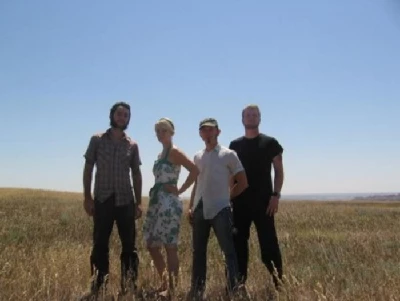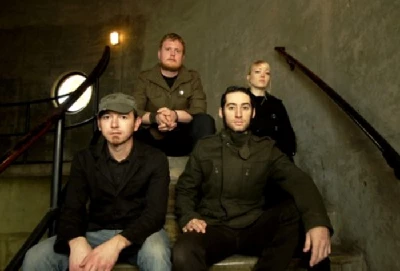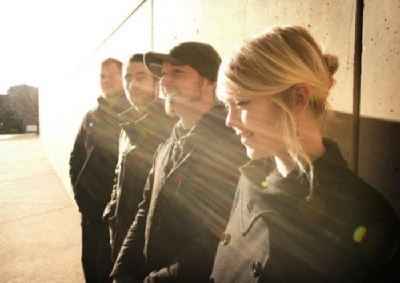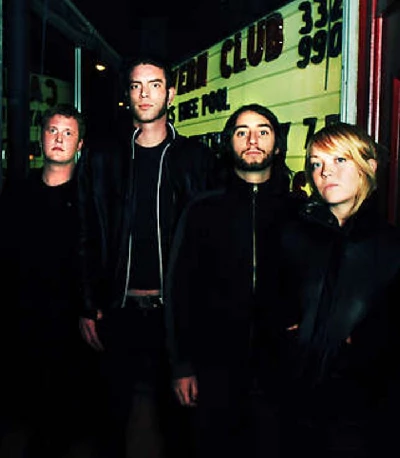published: 20 /
6 /
2008

Americana act Murder by Death combine their sound with elements of bluegrass and vintage rock and roll. John Clarkson talks to front man Adam Turla about their recently released fourth album, 'Red of Tooth and Claw', which is a concept album that is inspired in part by classical literature
Article
Murder by Death are an Americana group who combine their fiery sound with elements of bluegrass and vintage rock and roll.
The group, which comes from Bloomington in Indiana, currently consists of Adam Turla (vocals and guitar); Sarah Balliet (cello and keyboards); Matt Armstrong (bass) and Dagan Thogerson (drums). Since forming in 2000, they have released four albums, 'Like Exorcist, But More Breakdancing'(Eyeball, 2002) ; 'Who Will Survive, and What Will Be Left of Them ?' (Eyeball, 2003) ; 'In Bocca Al Lupo '(Tent Show Records, 2006) and this year's 'Red of Tooth and Claw'.
Murder by Death have recently been described as "creating dark and rumbling, drink hazed scenes of sin, redemption and guilt with an insouciant musical swagger and whiskey soaked lyricism."
'Red of Tooth and Claw', which came out on Vagrant Records, is a concept album, which is inspired in part by classical literature. It tells of an unnamed, violent anti-hero who crosses a magically realistic America with the intention of murdering his adulterous wife. When he finally after many adventures gets to his wife's place, he finds her pregnant and sleeping on a bed. He holds a knife over the slumbering girl, but, swayed by her unborn child, is unable to kill her and leaves. On his way out of the house, he meets his wife's new lover and in a fight which ensues has the knife turned on him. Left for dead, he staggers off and in his final evil act steals a car before driving off determined to atone for his past and to begin a new and better life.
Shortly before the start of a European tour, Adam Turla spoke to Pennyblackmusic about 'Red of Tooth and Claw'
PB : Why did you decide to call the new album ‘Red of Tooth and Claw’ ? Where does that phrase come from ? Is it a biblical term ?
AT : Actually, no. It’s from a poem by Tennyson, 'In Memoriam'. Some people use it to describe how nature is, meaning that is a brutal, no mercy kind of environment. The album has this running theme of man being like an animal and sometimes cruel. We felt that it was an appropriate name, given that theme.
PB : You’ve got a degree in religious studies and that has obviously influenced your lyric writing. Are you from a religious upbringing or background ?
AT : I am actually just interested in it. When I was a kid I was for the first nine years raised by a neighbour. She had been a nun for twenty years. My mother was always working and I spent a lot of time in my formative years with her and around people who talked about religion a lot. I have always found it interesting, but I don’t have any religion of my own.
PB : The album begins with ‘Coming Home’ and the protagonist on the start of this long journey. Do you see ‘Red of Tooth and Claw’ as having an element of Homer and Greek tragedy in it ?
AT : Yeah, that is ultimately what I was aiming for with it. One of the greatest stories ever written is ‘The Odyssey’ and I definitely made a lot of nods in there to that. The protagonist is on this journey is motivated purely by revenge and on '52 Ford', the last but one track on the album, he gets home and he is going to kill his wife who has been unfaithful, but at the last moment he decides to spare her. As he is leaving though…
PB : He gets into a fight with her new boyfriend and knifed himself.
AT : Yeah, exactly, so there is this classic tragedy set-up where the character overcomes their evil. They overcome their weakness and yet they are still fated to die.
In 'Red of Tooth and Claw' he, however, doesn’t die. He wakes up almost dead and turns things around. The reason I chose to do that was the idea behind the lyrics on that song was that he needed to be almost dead before he was going to fully change his dark ways. He gets to the point of almost dying and he goes as low as he can go before he is able to come back up, which is what some people require to be able to change.
PB : Most of the characters in it are pretty dislikeable, but as you say he redeems himself at the end. Do you see it as ultimately an optimistic rather than a pessimistic story ?
AT : Yeah, in the main part I guess that I do. I think that everybody likes the idea of overcoming oneself or your hang-ups. People like to see an underdog finish in first place. I wanted to create that kind of feeling at the end of that album. The last song at the end of that album,‘Spring Break 1899’, has that sort of resolve. I wanted it to end it on that note that at least this guy is going to try harder in the future.
PB : All the other tracks on it are quite heavy in sound, but that track, ‘Spring Break 1899’, is much more upbeat.
AT : Yeah, it has got that sort of classic 50’s balladic sound. It is like a 50’s rock ‘n’ roll track. That was the idea behind it. We wanted that song to be really different from the other songs on the album. It has become a really fun song to play live. It is quite cathartic and it a great way to end a set with it, especially on nights when we have been drinking heavily as it has got a real swagger to it at the beginning. It has become a favourite of ours to play live.
PB : How did you write this album ? Did you write the lyrics and then did the band write the music ?
AT : I wrote ‘Coming’ Home’ and I thought there was story in there and then lyrically I continued to develop that story. We all then tried to think of what could happen in this story and so we tried to create emotional climaxes in the music to match that. We worked how we wanted it to start and how we wanted it to end and then started to fill in the other pieces.
PB : Did you actually then plan the story out as a band as well ?
AT : To some extent. When I got stuck, I would mention the key lyrics that I had been working on and say, “Here’s what I’ve got here. What do you guys think needs to happen ?” I write about 95% of the lyrics, but I do get stuck and they always are there to help me. It is good to have a second opinion.
PB : One of the other intriguing things about the story was that you have got a group of gods watching over the anti-hero on ‘Run Brave’ and ‘A Second Opinion’ and trying to stop him from completing his journey. Do you see them as benevolent or evil gods ?
AT : That is a question I actually wonder myself. They are trying to stop him on his journey, but his journey is evil, His journey is to kill his wife. Originally I considered having two sets of gods, some evil gods supporting him and other gods trying to stop him. In the end I decided to leave it a bit more open. Lyrically it could be either. It could be bad gods trying to stop him because they don’t want him to succeed at all or it could be more distorted than that. She maybe has done all this awful stuff to him as well, so I left it open. I think the coolest part of ‘The Odyssey’ is that the gods in there also toy with Odyssus as he tries to make it home.
PB : There is an element of magic realism and the fantastic with a lot of your writing. On one of your earlier albums, ‘Who Will Survive and What Will be Left of Them ?’ there are zombies on that. As well as the gods, on another of the tracks ‘Ash’ the anti-hero falls in with a bunch of criminals and he sees them literally turning under his eyes into dogs. What is the appeal to you of writing as laterally as that ?
AT : Metaphor can be very useful but it is sometimes more interesting to actually have things physically happen. Sometimes in stories instead of just making an allusion to something or suggesting a word that creates an idea I think it is more fun to think that it actually happened.I have always loved music from people like Terry Gilliam that separate reality and create worlds that are partially real but also partially fantastistical. just like the combination or the perception of the real world being somewhat magical. I think that it is much more interesting to look at things with a crazy perceptive at least in fiction (Laughs).
PB : There is an instrumental track, ‘Theme;, which you dedicate to Ennio Morricone. Why did you dedicate it to him ?
AT : I wanted to dedicate it to him because I had written my guitar part and it really reminded me of his work. I wanted to have an instrumental on the album because I thought it would be cool to have just a pause, something that took away from the story and to create a landscape without lyrics.
The reason why I wanted to dedicate it to him was because what I liked about him was that he was an Italian composer writing music for Westerns that take place in America. I like the idea that the best art comes from people who are actually writing or creating from outside their own element. A lot of writers will say write about what you know. John Steinbeck, for example, wrote pretty much exclusively about the area of Southern California where he lived, but sometimes people writing about something out of their experience can come up with something pretty special as well.
I liked that about him and I thought that to some extent that thought also represented the storytelling on this album as well. We don’t live in a world where we have got people turning into dogs, but yet when I wrote about that and the gods for this album it was the most natural possible thing that could come out for me. I wanted to dedicate that song song to him just because I like that idea of the outsiders' perspective.
PB : The album was produced by Trina Shoemaker who has worked with people like Emmylou Harris, Iggy Pop and Queens of the Stone Age. What do you think she brought to the recording ?
AT : She brought an excellent sense of humour (Laughs), but beyond that I think just experience and wisdom and making sure that we got everything down in a way that really captured each song. I think the thing we appreciated most about her was that she made us feel very comfortable about our own songs. She didn’t change them at all. We did live tracking for all the instrumentation and we were so comfortable that in two or three takes we would have the take that we were going to use because she made us feel like we were going to get it done and it was going to be great. She gave us the encouragement we needed to make a good record.
PB : Was it a really quick album to record ?
AT : It was. We recorded the whole album in ten days, and then we mixed it it in nine. Trina did a great job on the sound quality, but she doesn't usually make records that quickly. She said that the Queens of the Stone Age album took months. She said that they spent a week on the drum part for one song. That is not a luxury that we have. We don’t have a budget like that though (Laughs)
PB : You have released your albums on several different labels. ''Red of Tooth and Claw' is your first release on Vagrant Records. Why did you decide to release this album through them ?
AT : Vagrant showed an interest in us first of all at the time of the last album. We weren’t really sure if they were the right label at first, but I liked how they had expanded to attract an older audience by signing acts such as the Hold Steady, Paul Westerberg, the Lemonheads and then had a younger audience with the bands they had always had traditionally had on their roster such as the Alkaline Trio. We have a pretty broad audience, but I remember being a young person and looking for music that I could get engrossed in and I, therefore, wanted our stuff to be out there and as readily available as possible to our younger fans.
PB : You have also self-released 'Red of Tooth and Claw' on vinyl and are currently doing re-releases of all your previous albums on vinyl . Why did you decide to do those ?
AT : We started doing them just because we like vinyl. Personally I love the large art. I love the fact that the art is huge. With CDs, people can lose them or they put them on their iPods and forget about them , but with vinyl it is like this big thing. It just feels like more substantial somehow. As well as looking great, it also sounds great. Recently there has been like a resurge of interest in vinyl and so we just keep repressing them.
PB : You’re a really old fashioned band in some ways because with the MP3 generation that emphasis on concept albums and on doing things on vinyl has largely gone. You, however, seem to be pretty successful at it.
AT : We have been scraping by (Laughs) and we are to some extent a response to that. I don’t like writing singles. I would like one of our singles to get played on the radio a bunch, but I don’t want to write songs to just be a single. It’s not how we do things As for the vinyl, we just like its style. Tha's why we do both of those.
PB :You have just finished a three and a half month epic tour of the States. Was that your longest tour to date ?
AT : We have done a couple that long. We have just toured the United States so many times that it is absurd. It has been how we have always made our money and it is how we have gotten in front of people, just by opening for other bands and then developing a following and making it grow. Three and a half months was tough, but we made it. Now we’re thrilled to be going to Europe. We feel very lucky that we can tour over there now.
PB : Will this be your first time over there ?
AT : No, it won’t. This will be be our third time in the UK and our second time in mainland Europe This will be our first time in some countries. We’re flying to Barcelona first all and we are playing Spain, France and Austria where we have never played before. We’re pretty excited.
PB : Final question ! Once you have done the European tour what will happen next ?
AT : We’re going to take a little time off for the summer and then we’re going to tour Canada and the US again and I am hoping we will go back to Europe in December to do an Italian tour.
PB : Thank you very much.
Picture Gallery:-



